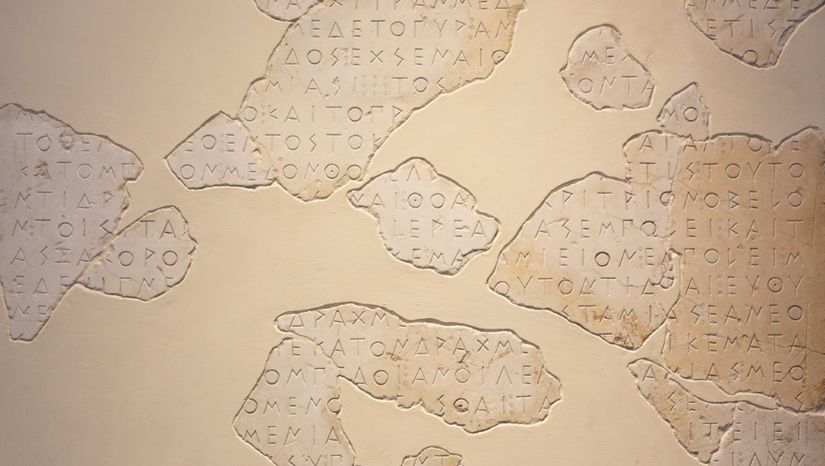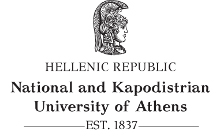- Αρχική
- NEWS AND EVENTS
- THE PROGRAM
- ADMISSIONS
- APPLICATION
- RESOURCES
-
ACADEMIC STAFF
- GEORGIOS ARABATZIS
- DIMITRA ANDRIANOU
- SOPHIA ANEZIRI
- ATHENA BAZOU
- GIORGOS BOUROGIANNIS
- AIKATERINI - NINA CARVOUNIS
- NIKOLAS DIMAKIS
- ELENI FASSA
- MYRTO GARANI
- NIKOS GIANNAKOPOULOS
- NIKOLAOS HAROKOPOS
- ROSALIA HATZILAMBROU
- NIKOLETTA KANAVOU
- CHRYSANTHOS KANELLOPOULOS
- GRAMMATIKI KARLA
- STYLIANOS KATAKIS
- EURYDICE KEFALIDOU
- KONSTANTINOS KOPANIAS
- AIKATERINI KOROLI
- EVGENIA D. MAKRYGIANNI
- STEPHANOS MATTHAIOS
- ANDREAS MICHALOPOULOS
- MICHEL ROGGENBUCKE
- ANDREAS MORAKIS
- YIANNIS PAPADATOS
- SOPHIA PAPAIOANNOU
- AMPHILOCHIOS PAPATHOMAS
- PETRAKIS VASSILIS
- VAIOS VAIOPOULOS
- DIMITRIS PLANTZOS
- ELENI PSOMA
- MARIANNA THOMA
- GIORGOS VAVOURANAKIS
- ANASTASIA VERGAKI
- IOANNIS VOSKOS
- TIMETABLE
- CONTACT
-
GALLERY
- VIDEOS
- PNYX, JULY 2021
- NATIONAL ARCHAEOLOGICAL MUSEUM, JULY 2021
- LYCEUM OF ARISTOTLE, NOVEMBER 2021
- THEATRE OF DIONYSUS, NOVEMBER 2021
- CRETE, NOVEMBER 2021
- ARCHAEOLOGY AND HISTORY OF ART MUSEUM AND CONSERVATION LABORATORY, SCHOOL OF PHILOSOPHY, DECEMBER 2021
- KERAMEIKOS, DECEMBER 2021
- EPIGRAPHIC MUSEUM, JANUARY 2022
- BRAURON, JANUARY 2022
- MYCENAE AND TIRYNS, APRIL 2022
- ANCIENT AGORA OF ATHENS, MAY 2022
- OLYMPIA AND DELPHI, MAY 2022
- NATIONAL ARCHAEOLOGICAL MUSEUM, JUNE 2022
- ACROPOLIS, JUNE 2022
- PARTICIPATION IN ARCHAEOLOGICAL SURVEY: IERAPETRA, CRETE, JULY-AUGUST 2022
- ANCIENT AGORA OF ATHENS, NOVEMBER 2022
- CRETE, NOVEMBER 2022
ΑΝΑΚΟΙΝΩΣΕΙΣ
FEBRUARY 9TH, INTERNATIONAL GREEK LANGUAGE DAY

February 9th was officially declared International Greek Language Day in 2017. The date of February 9 was selected because it is also the official commemoration day of the Greek national poet Dionysios Solomos, who wrote the Greek national anthem, titled ”Hymn to Liberty” (Ύμνος εις την Ελευθερίαν).
Greek belongs to the Indo-European family of languages and has been spoken uninterruptedly in the eastern Mediterranean for at least thirty-five centuries, from the age of linear-B tablets and Homeric heroes to our times, the times of social media, greeklish and of an unprecedented expansion in the production and diffusion of the printed word, of online and oral discourse. In the course of its long journey, Greek has managed to survive despite the numerous national, political, social and financial challenges its speakers had to face. As a means of communication and literary expression, it has been systematically cultivated, it has taken many forms, expressed various ideas, mentalities and philosophical systems. As a result, it has accumulated an unrivalled richness of vocabulary which enables the speakers of the present day to express demanding ideas with clarity and precision.
Greek has been since antiquity the means of expression of significant authors, philosophers and scientists. Homer, Sappho, Aeschylus, Herodotus, Sophocles, Thucydides, Euripides, Aristophanes, Hippocrates, Plato, Aristotle are among the many ancient Greek thinkers who cultivated the oldest form of our language and have passed on their intellectual heritage through it to the next generations. In the postclassic period, thanks to the conquests of Alexander the Great, Greek spread to the edges of the then known world. Challenged by the Roman conqueror, it emerged victorious: the Romans were deeply influenced by Greek culture and adopted many Greek words in their language. Greek was widely taught at that time and became the official administrative language of the eastern part of the Roman empire and, later, of the Byzantine empire. In short, Greek remained the main international language from the age of Alexander the Great to the fall of Constantinople in 1453 and was the mother tongue and the means of communication of most of the peoples of the eastern Mediterranean. The universality of Greek is reflected in the fact that it was the language in which the New Testament was written and into which the Old Testament was translated in the early Hellenistic period. Through Greek, classical culture and its eternal values were transmitted to the Byzantine empire. The Church Fathers and the byzantine scholars continued the work of the great thinkers of antiquity. Even after the fall of Constantinople, Greek language and thought were transferred along with Greek-speaking scholars to the West, and contributed to the intellectual and cultural Renaissance of Western Europe. In this way, Greek and, along with it, Greek culture have become the heritage of humanity in general.
From antiquity to the present day, Greek has been influenced from other linguistic systems, something which happens to all languages. This must not surprise us, for interaction between languages usually creates a highly productive dynamics in their development. The evolution of Greek from the second millennium BC to the present day has known tensions but also an admirable harmony and the Greek language has adapted to a series of historical, social and cultural challenges, particularly but not exclusively those mounted by the Western world, in all domains of life, thought, science and art.
Modern Greeks must feel lucky to be speaking a language that was once universal. This language, in its continuity across time, is a priceless element of our national and cultural identity. George Seferis has managed to express this in a few lines, written at difficult times (1941): ‘The Greek language, man, the sea… How marvellous it is to think that, from Homer’s time to the present, we are speaking, breathing and singing in the same language. And this has never stopped, whether it is Clytaemnestra talking to Agamemnon, or the New Testament or Romanus’s hymns and Digenis Akritas, or Cretan drama and Erotokritos, or folksongs. And all those, great or not, who have thought, spoken, counted in Greek, you must not think that they are like a path, a historical line, obscured in the night of the past and that they are outside of you. You must understand that all of these are inside of you, and that you will find them if you dig deep in yourself […]. Our modern literature is necessary to understand not only ancient literature but Greek tradition in its entirety’ (Dokimes, I, 177-8).
Professor Amphilochios Papathomas
Head of the Department of Greek Philology
School of Philosophy
The National and Kapodistrian University of Athens
Translation in English by Hélène Condylis
